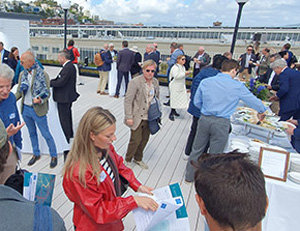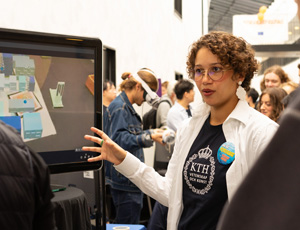Event support at ITM
Lectures, seminars, conferences and workshops are excellent opportunities to tell about, and create a dialogue about, your research.

It is worth paying some attention to an event, even if it is "just" a seminar. Reaching the right target group, attracting them to participate and then getting to know what they thought, makes a seminar more meaningful. Below is some advice and tips for smaller events and ITM's communication staff is happy to support you.
Before the seminar / workshop
Starting up
- Objectives, purpose and evaluation. Think about what you want to achieve with the event and how you will evaluate whether it gave the desired effect.
- Budget, resources and organisation. Who does what and what resources do you have?
- Target groups.
- Format. Develop an overall format and name for the event. Coffee with an expert and ITRL Breakfast Seminar are two good examples.
- Date of the event. Look in the KTH calendar to check that no other events occure at the same time. If your event is to be onsite at campus, it can be good to check the availability of premises early when looking at different dates. Also consider what time suits your target audience. The middle of the day can be good for people from different time zones if the event is digital.
- Scheduling. Identify milestones in the planning phase.
Plan
When the event enters the planning phase, there are often two clear tracks. Development of programs and content, and logistics.
- Logistics - Book premises, refurnish the premises, handle registrations, order catering and flowers are things that the Service Center can help with. Make your event request on the intranet .
- Create a digital meeting room, if the event is online.
- Create a registration form, or ask Service Center to do it. If the event is free, use KTH form or Ungapped. Otherwise read more on KTH evenemang's pages .
- Develop the program and identify speakers for the program.
- Create an attractive invitation – "brand" your event or your seminar series. Contact ITM's communicators via infomaster@itm.kth.se and they will help you with templates, concepts and invitation material.
- Write a structured and inviting program text.
- A clear and crisp title.
- An introduction that make people curious. Try to put the field or seminar in a context. “How do we get a more resilient industry? Size control over logistics is the key…. During this seminar, XXX talks about the C-PALS project ... "
- Then add a bullet list with core facts like: What? Why? For who? Where? When?
- Add more detailed information about the content of the seminar and the speakers, preferably with a picture of the people.
- Email a proposal for program text to infomaster@itm.kth.se and the communicators will help to edit further.
- Does the event or seminar series need a website? Email ITM's webmaster infomaster@itm.kth.se .
- Create a calendar event and report it to the public KTH calendar . Contact one of ITM's web editors to create an event on your department's website or center.
- Is printed material needed? Invitations, posters, information materials, nameplates, signs, etc.?
- Service Center can make nameplates, talking signs and street speakers.
- Read about how to order printed material and profile products at KTH .
- Other printed material like posters, flyers and invitations, please contact infomaster@itm.kth.se .
- Do you want to document the event?
- Contact press@kth.se if you want the press department to be present at the event.
- Appoint a photographer internally, who photographs during the event or contact infomaster@itm.kth.se who can take photos if time allows.
- Do you want to film the event? Consult infomaster@itm.kth.se .
- Don't forget to record the digital event.
- Put together a timetable. Identify all activities that take place during the event. Collect all participants, including suppliers' contact information.
Reach out
Suggestions for channels:
- E-mail. Spend some time compiling a good e-mail list: Partners, researchers, industry, press etc. Also send an invitation to KTH's all school communicators who can market the event in the internal or students' newsletters. Contact the communicators for:
- Electrical Engineering and Computer Science (EECS): communication-support@eecs.kth.se
- Engineering Sciences (SCI): webmaster@sci.kth.se
- Architecture and the Built Environment (ABE): info@abe.kth.se
- Engineering Sciences in Chemistry, Biotechnology and Health (CBH): webmaster@cbh.kth.se
- Student communication: info@kth.se
- Business and community: naringslivssamverkan@kth.se
- Posts on social media. We recommend personal profile pages on LinkedIn, ResearchGate and X for these purposes. Also tip infomaster@itm.kth.se and socialmedia@kth.se . Do not start a specific account for the event without first consulting socialmedia@kth.se .
- Meet KTH at kth.se. Contact evenemang@kth.se to be displayed there.
- Printed material such as posters and flyers.
- Digital screens.
During the event
- Go through the premises. Make sure to be on-site early to be able to go through all the premises and have time to correct any errors.
- Test the digital meeting rooms in advance.
- Have clear areas of responsibility in the event team to be able to more easily handle communication with suppliers, unforeseen events and be able to take care of speakers and other participants in a professional way.
- Film or record. Make a habit of filming all your seminars so that they can be used in other contexts. Add subtitles in KTH Play where you also can create a channel to link to from the website, invitation and newsletter. This is the best choice, instead of sending out Ppt presentations afterwards.
After the event
Ask participants for feedback
People are usually quite reluctant to give feedback via surveys, so first and foremost: do you need to evaluate each session? Maybe it's enough to do it once in a while, especially if it's something specific you want to know, but not every time.
- One way to get feedback in the Zoom era is to ask participants to leave a comment in the comment field in Zoom before leaving. This is easy for everyone to do. But you do not get feedback on specific details, this will be spontaneous. People may also be hesitant about what they dare to say because it is not anonymous. There is something called "Poll" for Zoom, as a quick survey.
- If you want to send out a questionnaire, use KTH form or Ungapped. We recommend that you send a survey no later than 24 hours after your event.
- Some guidelines for your "Post-event mailing". Include:
- links to presentations and recordnings
- the survey
- tips on upcoming events.
Survey content
Basic rule: Start with simple questions and let people go deeper towards the end with free text. To phrase questions, you need to know what you want to find out: If the speaker was good? If the technology worked? If the topic was relevant to the participant? Was the length of the seminar appropriate? Do not overdo it, keep it simple, a maximum of five questions.
Examples of questions:
- Did you watch the seminar? Yes No
- In which sector are you active? (Here we might want to know who they are. Title / unit?)
- How easy was it to join the seminar? Very simple, easy, neither or, difficult, very difficult
- How well could you take part in the content of the seminar? Very good, good, neither or, bad, very bad.
- How did you experience the participation remotely compared to being physically present at a similar event?
- How long did you attend the seminar? All of it, 30-59 min, 10-29 min
- All in all, what did you think of the event? (Both lecturer and content)
- How well-informed did you feel before the seminar on content and format?
- How important is it that KTH / ITM offers this type of activity? Extremely important, quite important, neither or, not so important, completely unimportant.
- Other comments. Do you have suggestions for lecturers, topics? Here you can leave rice and roses, feedback etc. (free text field)
Evaluate within the group
- Evaluate in the working group and with participants and suppliers.
- Evaluation of goals. Evaluation can take place in many different ways. Please contact the internal event support for more help with evaluation evenemang@kth.se .
Other things to do after the event
- Financial Accounting. Pay invoices, compile costs and determine the result.
- File the documents that need to be filed.
- Publish presentation materials online.

